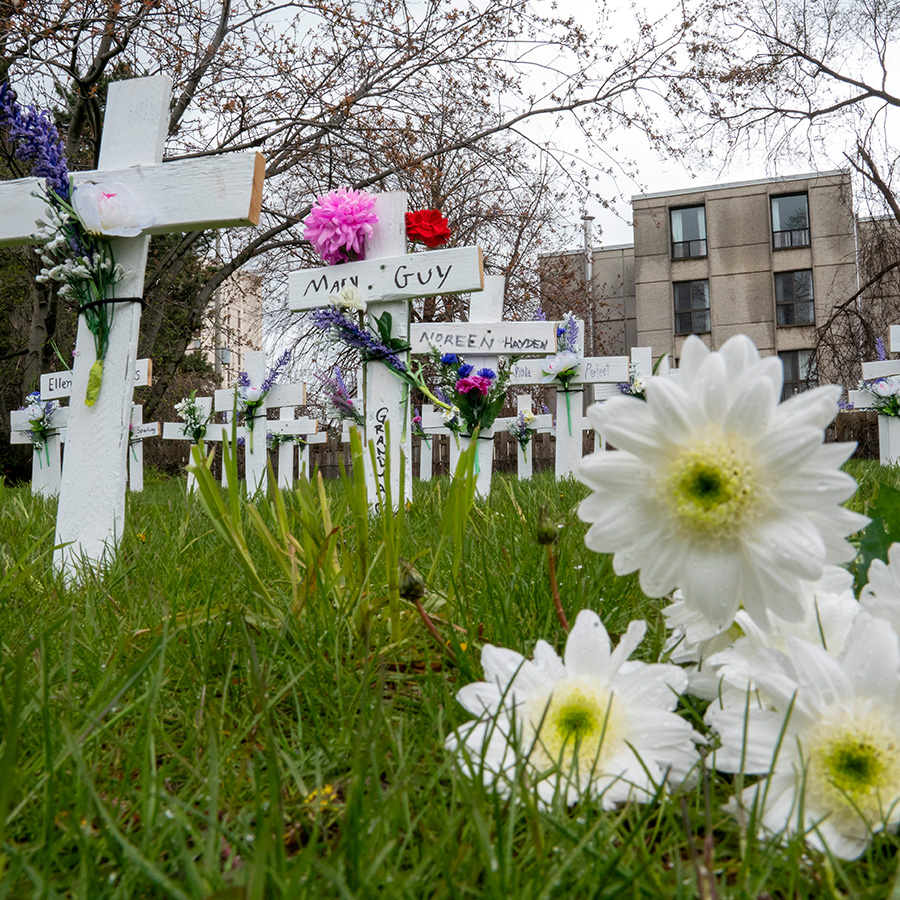On the First Anniversary of COVID-19 Being Declared a Pandemic, Remembering Those Canadians We’ve Lost

Prime Minister Justin Trudeau proclaimed March 11 — the first anniversary of the declaration of the COVID pandemic — a national day of observance to commemorate those who have lost their lives to the virus. Above, flowers rest in front of a sea of crosses placed to remember the residents of Camilla Care Community who have lost their lives due to COVID-19, in Mississauga, Ont., in May 2020. Photo: Frank Gunn / The Canadian Press
It’s been a long, hard, miserable stretch since the the World Health Organization declared COVID-19 a pandemic on March 11 last year.
All Canadians have had their lives completely upended and so many have lost beloved family members and friends in the first two waves of this deadly pandemic. And, perhaps the worst outcome of all — we haven’t had time to properly mourn for them.
In an effort to rectify this, Prime Minister Justin Trudeau has proclaimed today a national day of observance to commemorate those who have lost their lives to the virus.
“Early last year, our lives, and the lives of everyone around the world, were forever changed by the emergence of COVID-19,” Trudeau said in a statement.
“Today — one year after the first known death of a Canadian to the disease — we now mourn the tragic loss of more than 22,000 parents, siblings, friends, and loved ones.”
Since the pandemic arrived on our shores early last year, close to 900,000 cases have been diagnosed. And the resulting social and economic upheaval it has wrought has placed a difficult burden on every level of society — but especially older Canadians.
Of the more than 22,000 COVID-19 deaths (nearly half the number who died during the Second World War) that have been recorded so far, nearly 20,000 were people 70 or over. The scale of loss is even greater in the 80-plus age group, accounting for more than 15,000 — or 70 per cent — of all pandemic-related deaths.
The long-term care sector has been absolutely devastated, with far too many horror stories emerging of poor preparation and infection control and staff shortages leaving thousands of residents to die in appalling conditions. The numbers alone tell a grim tale of the death toll in nursing homes: according to the National Institute of Ageing’s tracker, in Quebec, 7,790 elder care residents died due to the virus, in Ontario 4,307 and in Alberta 1,198.
“During a time when the horrors of COVID have so affected older Canadians, it is imperative that efforts be
Today, however, is not about finding fault or or assigning blame to politicians or medical health officials for the disastrous fallout of the pandemic. Rather, it’s a timely opportunity to mourn the victims and express our sympathies to their family members.
“All Canadians have experienced sacrifice and loss over the past year. Our kids have missed birthday parties, seniors have felt isolated from the ones they love, and for far too many, this virus has meant the loss of their job or the closure of their business,” Trudeau added.
Besides acknowledging the incredible efforts of our “health care and other essential workers have put themselves at risk,” the Prime Minister also praised Canadians for their resiliency throughout the crisis.
“They have helped neighbours, given to organizations, put signs in their windows to support our health care workers, and lent a hand wherever possible,” he said. “Because here in Canada, we help each other through challenging times.”
RELATED
The Costs of COVID: Canadian Women Face Some of the Most Life-Altering Challenges in a Generation